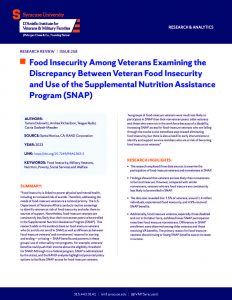“Food insecurity is linked to poorer physical and mental health, including an increased risk of suicide. Therefore, addressing the needs of food-insecure veterans is a national priority. The U.S. Department of Veterans Affairs conducts routine screenings to identify veterans at risk of food insecurity and refer them to sources of support. Nonetheless, food-insecure veterans are consistently less likely than their nonveteran peers to be enrolled in the Supplemental Nutrition Assistance Program (SNAP). This research adds to the evidence base on food-insecure veterans who do and do not enroll in SNAP, as well as differences between
food-insecure veterans’ and nonveterans’ reasons for starting and ending — or losing — SNAP benefits and patterns in these groups’ use of other safety-net programs. For example, veterans’ benefits could push their income above the eligibility threshold for SNAP. Although it is a federal program, SNAP is administered by the states, and the RAND analyses highlighted potential policy options to facilitate SNAP access for food-insecure veterans.

